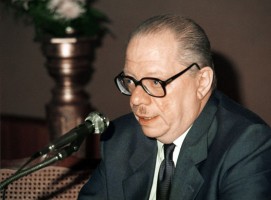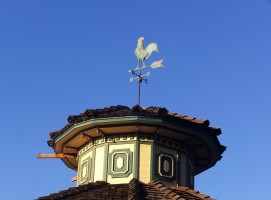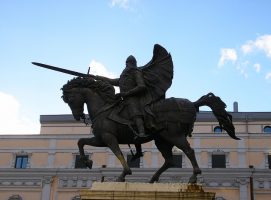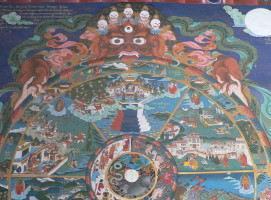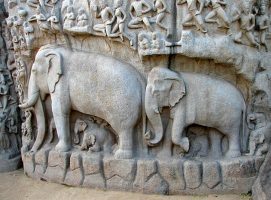Showing 434 articles
Eclecticism, Searching for Truth Beyond Fanaticism
Author: Jorge Angel LivragaOctober 3, 2014
“Eclecticism” is the name given to the philosophical position which, without objecting to anything a priori, analyzes and considers things, compares and relates them in search of the best of them all, with a view to finally selecting the one that is most qualified as worthy of acceptance. But this clear and concise definition, squarely [...]The Symbolism of the Tree
Author: M.A. Carrillo de Albornoz & M.A. FernándezSeptember 22, 2014
With its roots burrowing deep into the soil and its branches rising to the Heavens, the tree is universally seen as the symbol of the connection between Earth and Heaven. The tree enjoys such a central role that the World Tree is identified with the World Axis. Trees are also the bridge that connects the [...]The Symbolism of the Rooster
Author: M.A. Carrillo de Albornoz & M.A. FernándezSeptember 22, 2014
The rooster is a universal solar symbol because its crowing announces the dawn. In India, it is the attribute of Skandha, personification of solar energy. In Japan, its crowing, associated with the songs of the gods, lured Amaterasu, Goddess of the Sun, out of the cave where she had been hiding, corresponding to the manifestation [...]The Symbolism of the Egg
Author: M.A. Carrillo de Albornoz & M.A. FernándezSeptember 22, 2014
The egg is a universal and self-explanatory symbol because it holds the seed from which the whole of manifestation will spring. The idea that the universe was born from an egg is shared by nearly all ancient civilisations and cultures. The primordial man also originates from an egg, like Prajâpati. In general, the cosmic Egg, [...]Best Career In The World: To be An Idealist
Author: Yaron BarzilaySeptember 7, 2014
Which might be the best career in the world? Trying to answer this might suggest ideas such as “do nothing, earn a lot”. Maybe it involves working in some exotic destination, making money while having fun, etc. But when talking about a ‘career’, rather than a ‘job’, we are referring to a process of self-improvement [...]Gather Around the Fire
Author: Jorge Angel LivragaAugust 27, 2014
In the first of the twelve doorways that await us in this year 1983, it is good – or perhaps simply inevitable – to sharpen the sight and hearing of the Soul in order to detect what the future holds in store for us, based on the interaction between our own characteristics and the environment, [...]Practical Implications of the Theory of Reincarnation
Author: Alex WarrenAugust 27, 2014
Why reincarnation makes a difference in the way we live our lives. Every man’s soul has by the law of his birth been a spectator of eternal truth, or it would never have passed into this our mortal frame, yet still it is no easy matter for all to be reminded of their past by [...]The Power of Symbols
Author: Alex WarrenAugust 27, 2014
Symbols hold a powerful attraction for people. Even today, in an age in which materialistic perspectives rule human thought, many ancient symbols such as the ankh, the yin/yang, American Indian designs, pyramids, and many other symbols are quite popular in jewelry and in the home. Why do symbols of the ancient civilizations continue to be [...]The Symbolism of the Elephant
Author: M.A. Carrillo de Albornoz & M.A. FernándezAugust 26, 2014
The elephant, in its most global and universal meaning, symbolizes strength and power, not only physical but also mental and spiritual. In Hindu tradition, elephants call up the image of Ganesha, symbol of knowledge, son of Shiva and Parvati. His human body is the microcosm, manifestation, and his elephant’s head is the macrocosm, non-manifestation. He [...]The Symbolism of the Lotus
Author: M.A. Carrillo de Albornoz & M.A. FernándezAugust 26, 2014
In the Orient, this flower has various symbolic aspects but its main characteristics stem from the fact that it blossoms on stagnant waters. This is why the lotus is seen as a symbol of purity; although blossoming on murky waters it remains immaculate. Rising out of the darkness to blossom in full sunlight, this flower [...]Inner Freedom
Author: Guner OrucuAugust 26, 2014
Freedom is a concept that has always preoccupied mankind. We all want to be free; but free from what? Do we really know what kind of freedom we are looking for or how we can reach that freedom? We are going to use philosophy to investigate and to understand freedom with an emphasis on inner [...]The Myth of Unending Progress
Author: Jorge Angel LivragaAugust 26, 2014
The term “progress” derives from the Latin “progressus” which means, quite simply, the action of going forward. It is a mere illusion of the senses, intoxicated with hope, the supposition that every forward movement is synonymous with improvement, happiness and joy. The arithmetic progression of 1, 2, 3, 4, etc. does not mean that 2 [...]